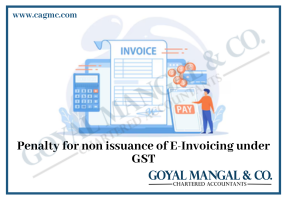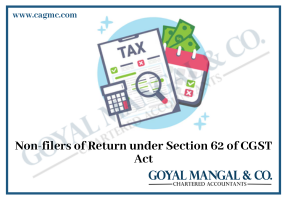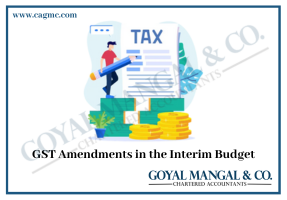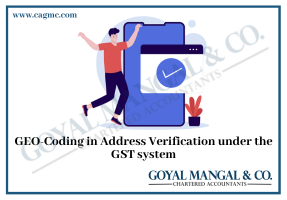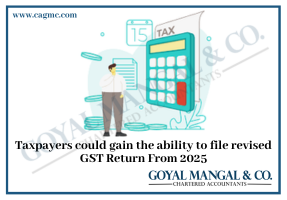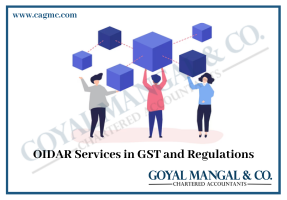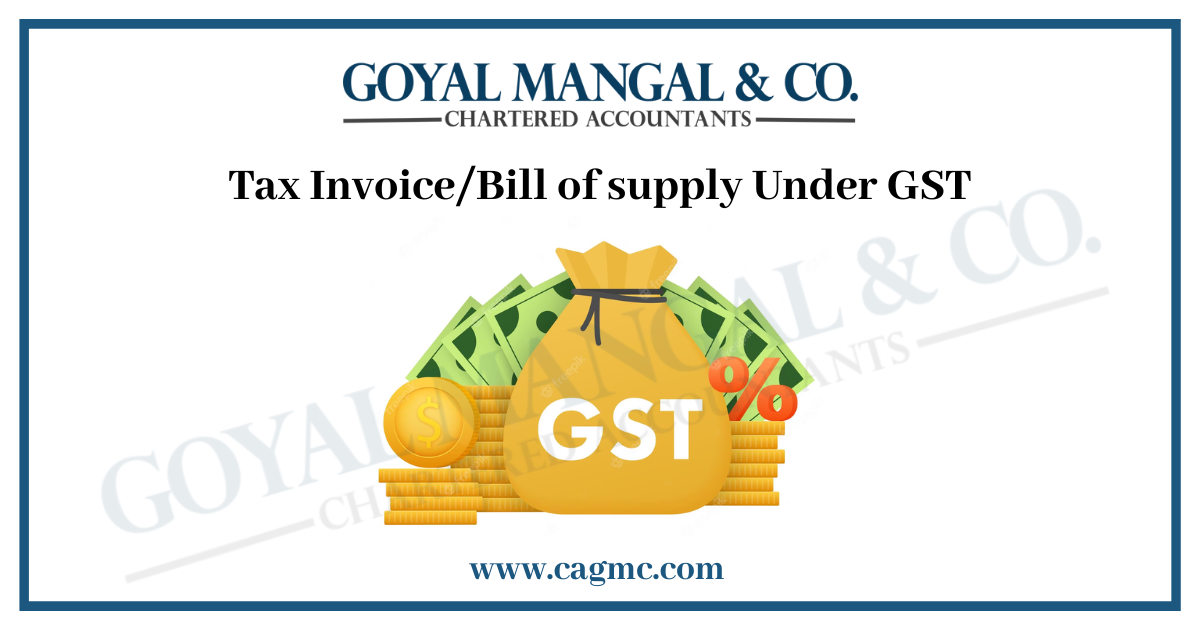
In the realm of Goods and Services Tax (GST), businesses are required to issue specific documents for their transactions to comply with the tax regulations. Tax invoices and bills of supply play a crucial role in the Goods and Services Tax (GST) regime. They are important documents that facilitate the seamless flow of goods and services, while also ensuring compliance with the GST law. The tax invoice and bill of supply are important documents under the Goods and Services Tax (GST) regime in India. In this article, we will look at what a tax invoice and bill of supply are, their differences, and when they should be used.
What is a Tax Invoice?
A Tax invoice is a document issued by a registered supplier of goods or services to a registered recipient. It contains details such as the name, address, and GSTIN (Goods and Services Tax Identification Number) of the supplier and consignee, the description, quantity, and value of goods or services supplied, the applicable rate and amount of tax, and other relevant details.
When can a Tax Invoice be issued?
Under GST, a Tax Invoice must be issued in the following cases:
- For the supply of taxable goods or services to a registered person
- For the supply of taxable goods or services to an unregistered person where the value of the supply is more than Rs. 50,000.
- For the delivery of goods or services through an e-commerce operator
The Tax Invoice should be issued within 30 days from the date of delivery of the goods or services. In the case of the delivery of goods, the tax invoice should be issued when the goods are removed from storage or when the goods are delivered, whichever occurs first. In the case of the supply of services, the tax invoice should be issued within 30 days from the date of the services.
What is a Bill of Supply?
In cases where a registered person supplies tax-exempt goods or services, or both, or the registered person pays tax under the settlement regime, a Bill of Supply should be issued instead of a Tax Invoice. The bill of sale does not contain any tax amount, as the seller cannot charge the buyer for GST. The bill of supply is proof of tax exemption, and taxes cannot be collected from the buyer of the goods or services.
When can a Bill of Supply be issued?
A Bill of Supply is a document issued by a registered supplier of goods or services in the following cases:
- For the supply of tax-free goods or services
- For the supply of goods or services that are not taxable under GST.
- For the supply of goods or services by the composition seller
The Bill of Supply does not contain any tax component, as no GST is charged on the supply. It contains details like the name, address, and GSTIN of the supplier and consignee, the description, quantity, and value of the goods or services supplied, and other relevant details.
What care should be taken while issuing the Invoice?
- Customer Details Verification: Before issuing a Tax Invoice, it is essential to verify customer details such as their name, address, GSTIN, and other relevant details to ensure that the invoice is issued to the correct recipient.
- Include all mandatory information: The Tax Invoice must include all mandatory information such as the name and address of the supplier, the name and address of the customer, the invoice number, the date of issue, the description of the goods or services provided, the quantity, price, rate, and amount of GST, and any other applicable taxes.
- Ensure compliance with GST laws: It is essential to ensure that the Tax Invoice complies with applicable GST laws and regulations, including correct GST calculation, correct tax rate, and appropriate classification of goods and services.
- Issue the invoice on time: The Tax Invoice should be issued as soon as possible after the delivery of the goods or service, preferably within 30 days of delivery.
- Record keeping: It is important to keep records of all Tax Invoices issued, including the invoice number, date of issue, customer details, and the amount of GST collected.
- Signature on the invoice: It is important that the Tax Invoice be signed by the supplier or responsible person. A signed invoice represents the authenticity of the invoice.
What is the Mandatory Requirement in an Invoice?
The Mandatory Requirements are as follows:
- Name, address, and GSTIN of the seller
- Buyer’s name, address, and GST IN
- HSN code or SAC for goods and services
- Invoice number (which should be serially numbered)
- Invoice date
- Description of goods and services
- Quantity of goods (e.g., metre, kg, etc.)
- The taxable value of the supply
- Applicable GST rates (CGST, SGST, IGST, UTGST, and Cess rates clearly indicated)
- The total value of the supply of goods and services
- Place of delivery, delivery address, and name of destination
- Whether GST is payable on a reverse charge basis
- Signature of the supplier or his authorized representative
What is the relaxation in case of Bill of Supply?
- Value less than Rs. 200: In case the value of goods, services, or both is less than Rs. 200, then it is not necessary to issue a delivery note.
- No signature or digital signature required: If the Bill of Supply is issued digitally or electronically, no signature or digital signature is required. Many times, we come across invoices that contain a statement.” This invoice is generated on a computer. It does not require a signature.”
- Relaxation for customer serial number and address: Due to the large number of transactions in the banking, insurance, and passenger transport sectors, taxpayers are not required to maintain customer addresses and serial numbers.
- Deemed Bill of Supply: In the case of a non-taxable supply (e.g., diesel, spirits), a Tax Invoice or other documents issued, or any other act, is considered a Bill of Supply.
- Consolidated Bill of Supply: When the value of goods or services supplied is less than Rs. 1200, a separate Bill of Supply is not required unless the buyer requests it. A consolidated Bill of Supply can be issued at the end of each day to each consignee separately.
- Invoice/Bill of Supply: If a registered person supplies both taxable and exempt goods and services, he can issue one “Delivery Invoice.”
- Relaxation in the case of an HSN or SAC code: HSN codes are 8 digits long, whereas SAC codes are 6 digits long. Relaxation is given for the number of digits of the HSN code, which is given below:
| Turnover | |
| Less than Rs. 1.5 crore | HSN code not required |
| Between Rs.1.5 crore – Rs. 5 crores | 2-digit HSN |
| Above Rs. 5 crore | 4-digit HSN |
Difference between Tax Invoice and Bill of Supply
The differences are as follows:
| GST Invoice | Bill of Supply |
| It can be issued in case of taxable supply. | It is issued in case of exempted supply. |
| Input Tax Credit can be issued on the basis of Tax Invoice. | Input Tax Credit cannot be claimed on the basis of Bill of Supply. |
| Amount of tax and rater of tax is mentioned on Tax Invoice. | Amount of tax and rate of tax is not mentioned in Bill of Supply. |
| Composition dealer cannot issue a Tax Invoice. | Composition dealer can issue a Tax Invoice. |
| In case the consignee is not registered and the value of the supply is more than Rs. 50,000, the following information is mandatory on the invoice:
o Name and address of the recipient o Delivery address o State name and its code |
No such Information is required in case of Bill of Supply. |
Conclusion
In conclusion, the concept of Tax Invoices under the GST Act is an important part of the taxation system in India. It is a legal document that contains all the necessary details. Moreover, it is the essential document for claiming Input tax credit in India.
